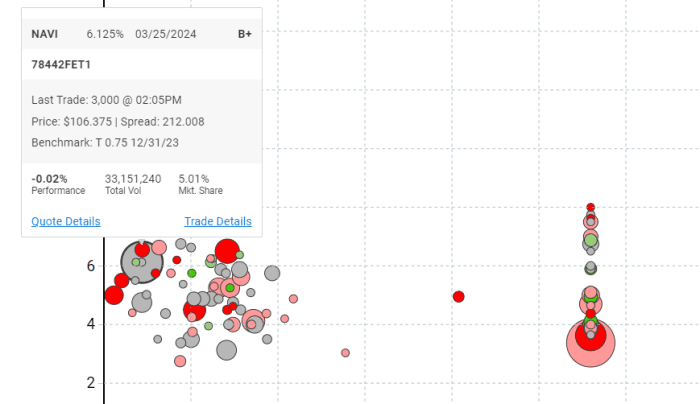This post was originally published on this site
Corporate bonds issued by Navient Corp. were the second-most actively traded on Friday in the U.S. junk-rated financial category, a day after the student loan giant agreed to a $1.85 billion deal to settle claims of abusive loan practices, according to BondCliq.
The settlement with 39 state attorneys general will provide more than $1.7 billion in relief to roughly 66,000 borrowers who will see their private student loans canceled. It also includes $95 million in payments to 350,000 federal student borrowers, whom Navient allegedly steered toward unnecessarily costly repayment programs.
However, active trading in the Navient’s
NAVI,
debt doesn’t mean a selloff (see chart). Rather on Friday, price action in the loan servicers most popular bonds was relatively stable.

Navient’s B+ rated bond are trading flat on heavy action after big settlement
BondCliq
The chart shows Navient’s 6.125% coupon bond, with B+ ratings and due March 2024, trading steady at roughly a $106 price and a spread, or premium, of about 212 basis points above the risk-free Treasury
TMUBMUSD10Y,
rate.
Bond spreads help compensate investors for default risk, but also have been low across the debt world after years of accommodative monetary policies.
Not all bond trading action in the sector, however, was flat Friday. The large red circle on the right, referencing the attached chart, represents trading pressure in Coinbase’s
COIN,
3.375% coupon bond, which has BB+ ratings and matures December 2049. It was Friday’s most active financial bond with ratings below investment grade.
That contrasts with Navient’s flat price action, which may stem from the settlement being of little surprise to debt investors, given the “long-running” status of the probe by State Attorneys General into Navient’s loan servicing practices, but also the “eminently manageable price tag: a $145 cash payment to the states and $1.7 billion in private student loan collections,” according to Jesse Rosenthal, head of U.S. financials at research firm CreditSights.
Notably, the $1.7 billion in student loans to be canceled by Navient already defaulted and have been charged off the company’s balance sheet, Rosenthal wrote, in a Wednesday client note. Navient also wasn’t required to admit wrongdoing as part of the AG settlement.
A spokesman for Navient pointed out that the settlement is expected to result in a roughly $50 million pre-tax expense, roughly what Navient expects to recover in the future on these charged-off loans.


